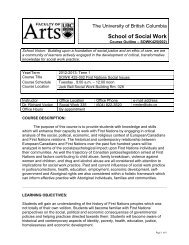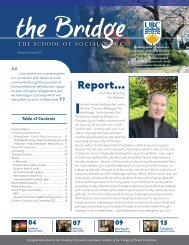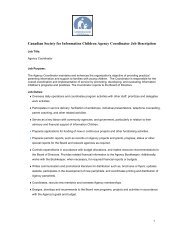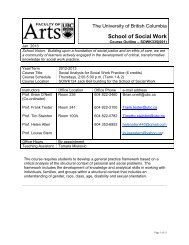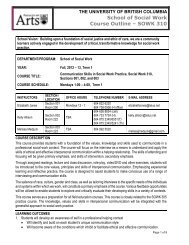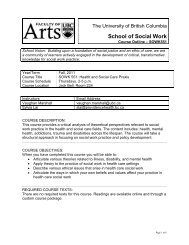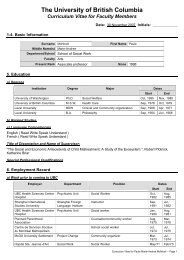Equity Case Studies Report - School of Social Work - University of ...
Equity Case Studies Report - School of Social Work - University of ...
Equity Case Studies Report - School of Social Work - University of ...
Create successful ePaper yourself
Turn your PDF publications into a flip-book with our unique Google optimized e-Paper software.
UBC school <strong>of</strong> social work equity and diversity strategic plan: A compilation <strong>of</strong> case studies 117<br />
marginalization and understanding the dynamics <strong>of</strong> oppression. These goals are in line with<br />
social work’s agenda <strong>of</strong> anti-oppression and social justice; however, the ability to articulate the<br />
issues and conceptualize ways to work against oppression is crucial in work with, and on behalf<br />
<strong>of</strong>, people from disenfranchised backgrounds.<br />
Description <strong>of</strong> Required Courses:<br />
SWK 4510H – Research for Evidence-Based <strong>Social</strong> <strong>Work</strong> Practice<br />
SWK 4512H – Creating Knowledge to Inform Critical Practice<br />
This course focuses on the tenets <strong>of</strong> critical and feminist methodology. Of central concern in this<br />
course is the utility <strong>of</strong> the research process for understanding and changing the social conditions<br />
that oppress different social groups whom we encounter in our practice as social workers. The<br />
course assumes that knowledge is power and thus its production is socially and historically<br />
determined. The course does not privilege one approach to research. During the course students<br />
will have the opportunity to: develop criteria for assessing the social nature <strong>of</strong> methodology;<br />
learn the dimensions <strong>of</strong> critical methodologies; assess the effects <strong>of</strong> research methodologies on<br />
the shape <strong>of</strong> social work theory, policies, programs and practices; develop conceptual<br />
frameworks and related researchable questions in their area <strong>of</strong> social work practice; master at<br />
least one approach to research design, data collection, analysis and dissemination; develop a<br />
research proposal that reflects a critical perspective.<br />
SWK 4304H – Globalization and Trans-nationalization: <strong>Social</strong> <strong>Work</strong> Responses Locally and<br />
Globally<br />
This course will critically analyze concepts and contradictions <strong>of</strong> trans-nationalization and<br />
globalization as seen locally and globally, and explore ways in which social work can respond<br />
creatively and effectively. Key concepts such as power, culture, human rights and social justice<br />
will be central to our discussions. Theories and problems <strong>of</strong> colonization, nationalism,<br />
capitalism, and development will be reviewed, and the issues <strong>of</strong> environment and peace will be<br />
addressed. Practice models and skills <strong>of</strong>ten used in transnational contexts will be identified (e.g.,<br />
popular education, empowerment, advocacy). Further, students will explore the examples and<br />
possibilities <strong>of</strong> local, international and transnational practice to work against/with/ around<br />
globalization.<br />
SWK 4306H Process <strong>of</strong> <strong>Social</strong> Exclusion, Marginalization and Resistance<br />
This course will examine a number <strong>of</strong> core notions, which, over time, have come to reflect<br />
different social realities <strong>of</strong> injustice, oppression, and inequity. It will link micro and macro<br />
dimensions, personal experience/and institutional realities. The three core courses <strong>of</strong>fer<br />
converging lenses. In this more theoretical course, genealogy <strong>of</strong> certain terms, the kinds <strong>of</strong> social<br />
realities they have covered over time, what they miss, and how different frameworks highlight<br />
particular practices, will be focussed. This course will adopt a historical perspective to the<br />
examination <strong>of</strong> a selected number <strong>of</strong> critical concepts. Multiplicity <strong>of</strong> concepts drawn from<br />
various schools <strong>of</strong> thought, modernist, post-structural and post-modern thought, including critical<br />
feminism, and (post)colonialism will be examined. Issues traditionally associated with social<br />
exclusion (marginalization and resistance, including poverty, racism, anti-Semitism, gendered



